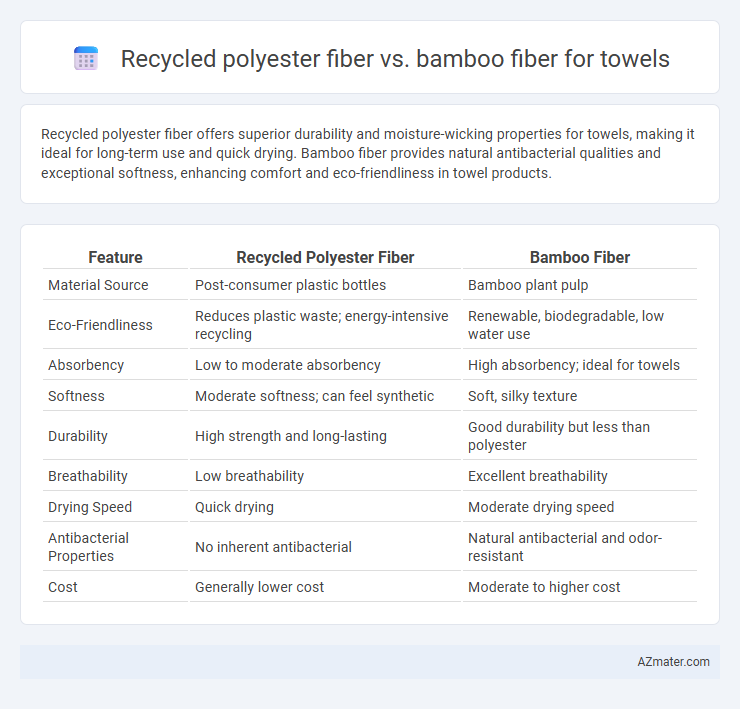Recycled polyester fiber offers superior durability and moisture-wicking properties for towels, making it ideal for long-term use and quick drying. Bamboo fiber provides natural antibacterial qualities and exceptional softness, enhancing comfort and eco-friendliness in towel products.
Table of Comparison
| Feature | Recycled Polyester Fiber | Bamboo Fiber |
|---|---|---|
| Material Source | Post-consumer plastic bottles | Bamboo plant pulp |
| Eco-Friendliness | Reduces plastic waste; energy-intensive recycling | Renewable, biodegradable, low water use |
| Absorbency | Low to moderate absorbency | High absorbency; ideal for towels |
| Softness | Moderate softness; can feel synthetic | Soft, silky texture |
| Durability | High strength and long-lasting | Good durability but less than polyester |
| Breathability | Low breathability | Excellent breathability |
| Drying Speed | Quick drying | Moderate drying speed |
| Antibacterial Properties | No inherent antibacterial | Natural antibacterial and odor-resistant |
| Cost | Generally lower cost | Moderate to higher cost |
Introduction: The Rise of Sustainable Towels
Sustainable towels increasingly rely on recycled polyester fiber and bamboo fiber due to their eco-friendly benefits and durability. Recycled polyester fiber is made from post-consumer plastic waste, reducing landfill impact and energy consumption compared to virgin polyester. Bamboo fiber offers natural antibacterial properties and biodegradability, making it a popular choice for eco-conscious consumers seeking softness and moisture-wicking performance.
What is Recycled Polyester Fiber?
Recycled polyester fiber is made from post-consumer plastic waste, such as PET bottles, processed into new textile fibers that reduce environmental impact by minimizing landfill and ocean pollution. This fiber offers high durability, moisture-wicking properties, and quick drying, making it suitable for towels that require frequent washing and long-term use. Compared to bamboo fiber, recycled polyester maintains better shape retention and abrasion resistance, while offering a sustainable alternative by repurposing existing plastic materials.
Understanding Bamboo Fiber: Source and Production
Bamboo fiber is derived from the pulp of bamboo grass, transformed through either mechanical or chemical processes into soft, absorbent textile suitable for towels. Its production typically involves eco-friendly methods that minimize water usage and chemical inputs compared to conventional fibers, enhancing sustainability credentials. This natural origin and biodegradability make bamboo fiber an increasingly popular choice for eco-conscious consumers seeking durable, moisture-wicking towels.
Environmental Impact: Recycled Polyester vs. Bamboo
Recycled polyester fiber for towels significantly reduces plastic waste by repurposing post-consumer PET bottles, lowering energy consumption and greenhouse gas emissions compared to virgin polyester production. Bamboo fiber offers a renewable alternative with natural biodegradability and requires less water and pesticides than conventional cotton, but its environmental benefits depend heavily on sustainable farming and processing methods that avoid chemical-heavy viscose production. Choosing between recycled polyester and bamboo fiber for towels involves weighing lower carbon footprints from recycled materials against the renewable, biodegradable potential of bamboo when certified sustainable.
Absorbency and Softness Comparison
Recycled polyester fiber offers moderate absorbency but excels in durability and quick-drying properties, making it suitable for active use towels. Bamboo fiber is highly absorbent and naturally antibacterial, providing superior softness and a smooth, gentle texture ideal for sensitive skin. Towels made from bamboo fiber generally outperform recycled polyester in absorbency and tactile comfort, enhancing the overall user experience.
Durability and Longevity Analysis
Recycled polyester fiber offers superior durability and longevity for towels due to its strong synthetic composition, resisting wear, shrinkage, and quick drying without compromising structural integrity. Bamboo fiber towels provide natural antibacterial properties and softness but tend to wear out faster and lose strength over multiple washes compared to recycled polyester. Choosing recycled polyester fiber ensures towels maintain shape and absorbency over time, while bamboo fiber towels prioritize eco-friendly softness with moderate durability.
Health and Skin Sensitivity Considerations
Recycled polyester fiber, made from post-consumer plastic bottles, offers durability and quick-drying properties but may retain chemical residues affecting sensitive skin. Bamboo fiber, naturally antimicrobial and hypoallergenic, provides softness and breathability ideal for individuals with eczema or psoriasis. Choosing bamboo towels reduces exposure to synthetic chemicals, promoting better skin health and comfort for sensitive users.
Cost and Market Availability
Recycled polyester fiber offers a cost-effective option for towels, often priced lower due to established recycling processes and widespread industrial use, making it readily available in the global market. Bamboo fiber, although sustainable and naturally antibacterial, tends to be more expensive due to limited large-scale production and higher processing costs, which can restrict its availability in mass markets. Market trends indicate a growing preference for recycled polyester in budget-friendly and eco-conscious towel products, while bamboo fiber remains a niche choice for premium, natural-fiber towels.
Eco-Certifications and Standards
Recycled polyester fiber towels often carry certifications such as GRS (Global Recycled Standard) and OEKO-TEX Standard 100, ensuring sustainable sourcing and absence of harmful substances. Bamboo fiber towels may hold certifications like FSC (Forest Stewardship Council) or PEFC (Programme for the Endorsement of Forest Certification), indicating responsible forestry practices and eco-friendly production. Both fibers comply with ecological standards, but recycled polyester emphasizes waste reduction and chemical safety while bamboo focuses on renewable raw materials and biodegradability.
Conclusion: Choosing the Best Fiber for Towels
Recycled polyester fiber offers superior durability, moisture-wicking properties, and eco-friendly benefits by repurposing plastic waste, making it ideal for long-lasting, quick-drying towels. Bamboo fiber provides natural antibacterial qualities, exceptional softness, and biodegradability, appealing to those prioritizing comfort and sustainability. Selecting the best fiber depends on whether durability and water resistance (recycled polyester) or softness and eco-friendliness (bamboo fiber) align better with consumer needs and environmental goals.

Infographic: Recycled polyester fiber vs Bamboo fiber for Towel
 azmater.com
azmater.com